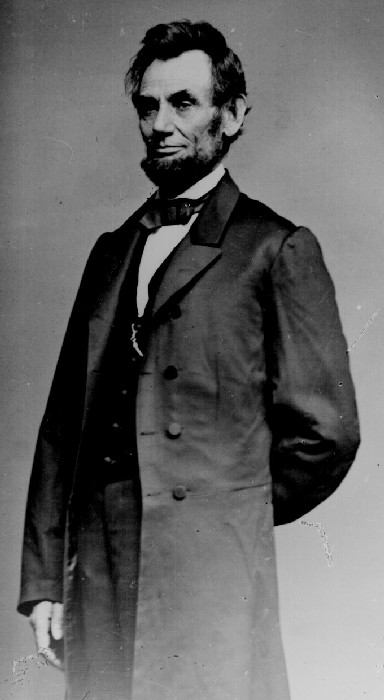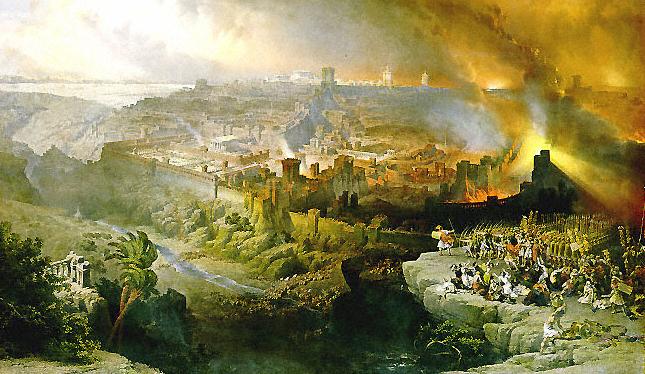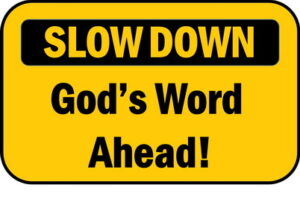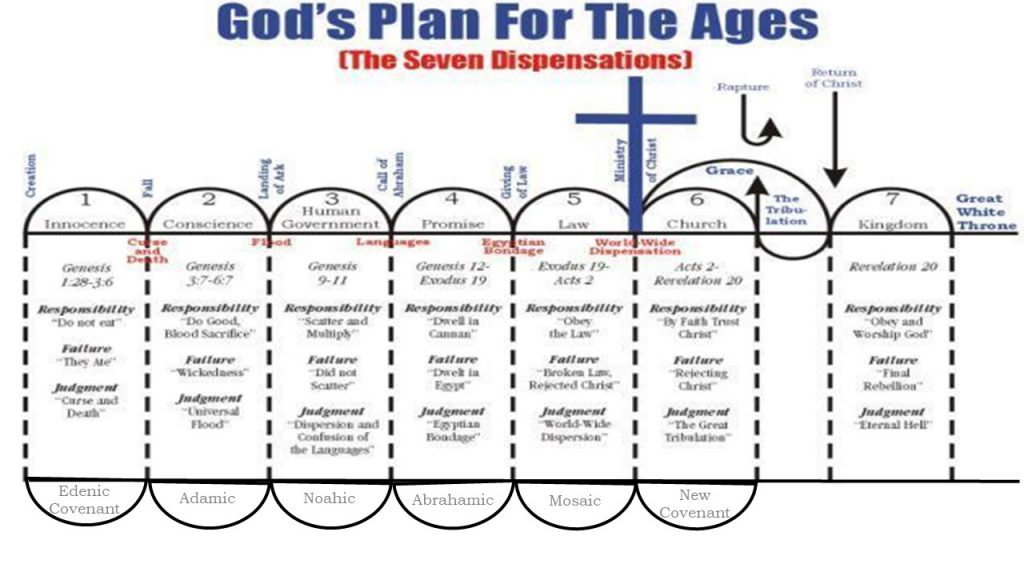Hebrews 1:1-4 — Who Said That?
Sometimes we hear or read something that really strikes home, and we are very interested i![]() n knowing in who said it. How about “Better to remain silent and be thought a fool, than to speak out and remove all doubt.” We have Abraham Lincoln to thank for that one!
n knowing in who said it. How about “Better to remain silent and be thought a fool, than to speak out and remove all doubt.” We have Abraham Lincoln to thank for that one!  While we study the book of Hebrews, we will often be impressed with the importance and effectiveness of what is stated, although we aren’t able to know who said it! But wait – although we don’t know the human author of Hebrews, we do know the True Author — God Himself has declared these truths for us. And, if you have received Jesus Christ as your Savior, you have the privilege of knowing the Author personally!
While we study the book of Hebrews, we will often be impressed with the importance and effectiveness of what is stated, although we aren’t able to know who said it! But wait – although we don’t know the human author of Hebrews, we do know the True Author — God Himself has declared these truths for us. And, if you have received Jesus Christ as your Savior, you have the privilege of knowing the Author personally!
We have God’s revealed truth, not only in Hebrews, but in the whole counsel of His written Word. It is written by Him, and it is about Him. Yet while we have this large treasury of written words that are the very mind and heart of God, we also are r eminded in the introduction to Hebrews that the most important revelation God has provided is His Son, the Living Word of God.
eminded in the introduction to Hebrews that the most important revelation God has provided is His Son, the Living Word of God.
When Jesus was transfigured on Mount Hermon, He was revealed in His full glory as God. The three disciples, Peter, James and John, were present with Jesus that day. They were told by God the Father to “Listen to Him”, that is, to Jesus. He is the full and complete revelation of God, and we need to listen closely to His every word. We need to realize just how significant He is to man’s history. The writer of Hebrews has a large task ahead of him as he moves to demonstrate how superior Jesus Christ is to every other spiritual belief man has.

Who Wrote Hebrews?
The writer of the Bible book of Hebrews chose not to disclose his name. More interesting, there is no indication from historical records and Bible scholars of the 1st-2nd century, nor is there any early church tradition that provides any help in identifying this writer. Origen (a Chrisian theologian born around 185AD) said flatly “only God knows” who wrote Hebrews – so there you go.
is no indication from historical records and Bible scholars of the 1st-2nd century, nor is there any early church tradition that provides any help in identifying this writer. Origen (a Chrisian theologian born around 185AD) said flatly “only God knows” who wrote Hebrews – so there you go.
Common opinion has often settled on it being Paul, and there are notable Pauline features in the book, but there are good reasons not to be sure. Bible scholars have provided a great deal of observations about the book that combine into something of a profile of the nameless writer. His deep knowledge of Hebrew Scripture and theology, his mastery of high quality Greek, his eloquence of language and rhetoric, these and other distinctives combine to lea ve the question unanwered. Note that a masculine pronoun reference in Heb.11:32 narrows the writer down to being a man, so Priscilla is out. Other reasonable candidates are Apollos and Barnabas. One other feature about the book that reflects on the nature of the writer is that the book very possibly was written in Hebrew and later translated into Greek.
ve the question unanwered. Note that a masculine pronoun reference in Heb.11:32 narrows the writer down to being a man, so Priscilla is out. Other reasonable candidates are Apollos and Barnabas. One other feature about the book that reflects on the nature of the writer is that the book very possibly was written in Hebrew and later translated into Greek.
An interesting side note: In addition to not providing his own name, the writer makes many OT citations, but never mentions who the quote is from, e.g., Moses or David. This becomes so obvious as to be a purposeful emphasis by the writer to place focus on God Himself as the speaker of this book.
Why is the book titled “Hebrews”?
In most of the NT letters, we can read right at the beginning of the letter who the letter is to, whether it be an individual or a group. We don’t have that insight for Hebrews. There is dependable testimony from 2nd century sources that the book was already understood as being “to the Hebrews”. In understanding the audience for this book as being a broad group of Hebrew Christians, we build a more informed picture by noting other circumstances that would have been impacting a Christian audience of the mid-first century time period.
The book is probably dated around 65AD – note that the Temple and its activities are a large subject in the book, and since there is no mention of the Temple being destroyed (pictured here), this dates the book before 70AD. Emperor Nero burned Rome to the ground in 62AD. He was under intense criticism for  his actions so he chose to place blame on the Christian community. This initiated horrible persecution across the Roman Empire. Over the next several years, much of the Christian population became refugees forced to run for their lives to surrounding countries and start life over again. Life was really rough for these families living in unfamiliar lands, separated from friends and relatives, forced to work at anything in order to have the basic needs of life. This “dispersion” raised up the need for the “Pastoral” letters to be written that ministered to these unique needs, including the book of Hebrews.
his actions so he chose to place blame on the Christian community. This initiated horrible persecution across the Roman Empire. Over the next several years, much of the Christian population became refugees forced to run for their lives to surrounding countries and start life over again. Life was really rough for these families living in unfamiliar lands, separated from friends and relatives, forced to work at anything in order to have the basic needs of life. This “dispersion” raised up the need for the “Pastoral” letters to be written that ministered to these unique needs, including the book of Hebrews.
The persecution had a de-stabilizing impact on the faith of many, and recall that a majority of Christians of the late first century would have been Jews. These difficult times caused many to be tempted to fall back on the rituals and disciplines of their former Jewish tradition. The book of Hebrews is not really a letter, but comes across as more of a “treatise”, an elaborate development of why Jewish traditions are inferior to faith in the finished work of Christ on the Cross. This treatise is written with pastoral compassion while challenging the readers to be faithful to the Gospel in which they have placed their faith.
When God Speaks: Listen Up!
Psalm 78:1, “Listen, O My people”, is addressing Israel by reviewing their turbulent history from their slavery back in Egypt all the way to David’s glorious reign. This strikes a familiar chord to the Jew in which God calls on His people to turn a “listening ear” to His revelation. Several terms are used for God’s revelation in this Psalm, similar to Psalm 119. These terms remind the reader of God’s extensive work of revelation. Use these passages as a foundation for meditating on the greatness of God’s revelation to man throughout the Bible, and as celebrated in Hebrews 1.
- In Deut. 6:1, the great Jewish “Shema” passage, we read “Hear, oh Israel, the Lord He is One.” The following verses speak of parents teaching children the rich truths of our faith.
- The way we listen to God’s word is indicated by our response and performance; response leads to results; e.g., a young child may listen but can be very superficial.
- Read Nehemiah 8, and think about the substantial response shown by the people after genuine listening to God’s Word was done with heart and mind.
In Times Past
Heb 1:1-4 is a great declaration about Christ, a major passage in the Bible’s “A List” of what we need to know as believers. In the KJV, the passage begins interestingly “…sundry times… divers manners…” which might make you think about ice cream or scuba lessons. But old English notwithstanding, that’s not quite the intent of the writer – he is referring to the many channels, phases, and methods used by God in His revelation to man. He used different historical times, locations, cultures, situations, men and women who lived across 2000+ years of human history from all levels of social strata – supernatural and natural, nature, even a donkey.
- God’s own work to reveal Himself to His creation – the Master Creator, having lost fellowship with man because of sin, seeking to reconcile with man – He provides us with all that we need to know about Who He is, what He does, how He acts, and how we can be restored to that relationship with Him.
- 2 Timothy 3:16-17 addresses the man of God, the believer who wants to honor and serve God! God breathed into the words of Scripture His life, mind, heart (compare this to God breathing life into Adam) so that we could live according to His design.
- Note the work of God to provide the inspired Word – inspiration, authentication (church recognizing and finalizing the books of the canon), preservation (protection through the ages from efforts to eradicate the Bible, Judaism & Christianity.
- According to this passage, why do we have the Bible? So that the man of God would be completely, adequately prepared to wield the sword! to be a Man (or Woman) of God!
 Before Proceeding… Please take a few minutes now to read through Hebrews 1. Go slowly and take the time to note the important things the writer says — highlight or underline, maybe make a couple of notes in the margin. Delight and enjoy your time in God’s Word! His Word is like sweet honey in our heart! (Psa. 119:103)
Before Proceeding… Please take a few minutes now to read through Hebrews 1. Go slowly and take the time to note the important things the writer says — highlight or underline, maybe make a couple of notes in the margin. Delight and enjoy your time in God’s Word! His Word is like sweet honey in our heart! (Psa. 119:103)
In These Last Days
Hebrews 1:1-2, From past to last – from what God revealed and did in the past (for and against Israel, often announced before following through) to what we now know He revealed in the present in Christ. Further in this chapter, He states that His revelation includes what He plans to do in the future. What are the “Last Days”? The Greek “eskatos” means “last things” – a special term in the Bible, referring generally to the conclusion of God’s program of judgment on sin and redemption for man.
When did the “last days” start”? This theme includes judgment and deliverance, proclaimed mainly by OT prophets, then by Jesus and the Apostles. It is closely associated with the “Day of the Lord”, a major doctrinal theme of prophecy which elaborates God’s plan for final judgment on sin and fulfillment of His promises for restoration and salvation. Many see the last days beginning with the death of Christ. This seems reasonable, but we understand the Day of the Lord to be a larger agenda that God has been in the process of executing at least since the time of the prophets, and won’t conclude until the Messiah establishes the Millennial Kingdom. The coming of God’s promised Messiah, occurs in two phases, the first of which saw Jesus Christ born in Bethlehem and then crucified on Calvary. The second phase will be His Second and Final coming when He sits on David’s throne in the New Jerusalem of the Millennial Kingdom.
In 2 Pet 3:1-5, God is said to be “stirring us up” with words spoken by OT prophets which proclaimed the promise of the Messiah’s coming. So, although Peter is addressing 1st century Christians and speaking of prophets in the Old Testament who were addressing Jews of the previous centuries before Christ, yet now more than ever, Christians in the Church Age must be aware that God’s program is being brought to a close.
Peter quotes Joel 2:28-31 as he preaches in Acts 2:17-21, describing what God’s “Day of the Lord” will be like. Some interpret Joel’s words with a “near view” of early OT prophets declaring coming judgment on Israel and surrounding nations, historical events which actually occurred shortly after being spoken, and we know that sometimes occurred for the prophets. But we sometimes also need to interpret OT prophecy with a “long view”, which includes foretelling events that haven’t occurred even yet (in the time of the prophet) and will occur in the coming decades or in some instances 1000+ years later, and indeed in even haven’t occurred yet, as is the case of the Millennial Kingdom. Regarding this understanding of near and far prophecy, read Hosea 3:5; Isaiah 2:2; Malachi 4:1-2.
Interpreting Scripture with a literal methodology show us God’s Progressive Revelation in the Dispensations of time as God has moved His program of Redemtption along. This chart helps us to put man’s experience in perspective with God’s revealed truth.

![]() Bible Study Journal
Bible Study Journal
1. Who wrote the book of Hebrews?
2. When might Hebrews have been written?
3. One group the book of Hebrews was written to was Jewish believers. What was the danger they were facing?
4. What did the Holy Spirit want to show the unconvinced Jews–the third group of people Hebrews was written to?
5. What to you is the main message of Hebrews?
6. How did God establish a relationship with the nation of Israel when physical presence with Him was not possible?
7. Why does Heb. 8:6 say the covenant that Christ mediated is better than the old one?
8. Why was it difficult for many Jewish people to accept the New Covenant as superior to the old one?
9. What is a good summary of the book of Hebrews (Heb. 8:1)?
10. What is the difference between the religions of man and Christianity?
11. What are some of the different ways in which God communicated to believers during Old Testament times?
12. Why is the Old Testament considered to be progressive revelation?

Note: Unless otherwise noted, all Scripture is quoted from the New American Standard Translation.




